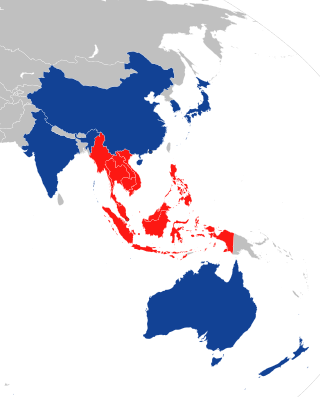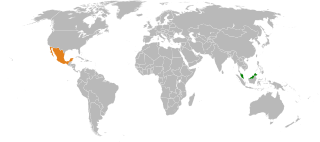Related Research Articles

The ASEAN Free Trade Area (AFTA) is a trade bloc agreement by the Association of Southeast Asian Nations supporting local trade and manufacturing in all ASEAN countries, and facilitating economic integration with regional and international allies. It stands as one of the largest and most important free trade areas (FTA) in the world, and together with its network of dialogue partners, drove some of the world's largest multilateral forums and blocs, including Asia-Pacific Economic Cooperation, East Asia Summit and Regional Comprehensive Economic Partnership.

The East Asia Summit (EAS) is a regional forum held annually by leaders of, initially, 16 countries in the East Asian, Southeast Asian, South Asian and Oceanian regions, based on the ASEAN Plus Six mechanism. Membership expanded to 18 countries including Russia and the United States at the Sixth EAS in 2011. Since its establishment, ASEAN has held the central role and leadership in the forum. EAS meetings are held after the annual ASEAN leaders' meetings, and plays an important role in the regional architecture of Asia-Pacific. The first summit was held in Kuala Lumpur, Malaysia on 14 December 2005.

The Bay of Bengal Initiative for Multi-Sectoral Technical and Economic Cooperation (BIMSTEC) is an international organisation of seven South Asian and Southeast Asian nations, housing 1.73 billion people and having a combined gross domestic product of US$5.2 trillion (2023). The BIMSTEC member states – Bangladesh, Bhutan, India, Myanmar, Nepal, Sri Lanka, and Thailand – are among the countries dependent on the Bay of Bengal.

Under the Basic Law, Macau's diplomatic relations and defence are the responsibility of the central government of China. Except diplomatic relations and defence, nonetheless, Macau has retained considerable autonomy in all aspects, including economic and commercial relations, customs control.

New Zealand is party to several free trade agreements (FTAs) worldwide.

The Act East policy is an effort by the Government of India to cultivate extensive economic and strategic relations with the nations of Southeast Asia to bolster its standing as a regional power and a counterweight to the strategic influence of the People's Republic of China. Initiated in 1991, the Look East policy by Indian government marked a strategic shift in India’s perspective of the world. It was developed and enacted during the government of Prime Minister Narsimha Rao (1991–1996) and rigorously pursued by the successive administrations of Atal Bihari Vajpayee (1998–2004) and Manmohan Singh (2004–2014).

India-Singapore relations, also known as the Indo-Singaporeanrelations, are the bilateral relations between India and Singapore. Relations between the two countries have traditionally been strong and friendly, with the two nations enjoying extensive cultural and commercial relations. India and Singapore have signed the Comprehensive Economic Cooperation Agreement (CECA) and strategic-relationship agreement in order to increase trade, investments and economic cooperation, and expanded bilateral cooperation on maritime security, training forces, joint naval exercises, developing military technology and fighting terrorism.

Malaysia–New Zealand relations refers to foreign relations between Malaysia and New Zealand. Malaysia has a High Commission in Wellington, and New Zealand has a High Commission in Kuala Lumpur. Both countries are full members of the Commonwealth of Nations and Malaysia is important to New Zealand for strategic, political and economic reasons, with both countries' leaders were engaged in frequent visits to boost their relations.

The China–Japan–South Korea trilateral summit is an annual summit meeting attended by the People's Republic of China, Japan and South Korea, three major countries in East Asia and the world's second, fourth and 12th largest economies. The first summit was held during December 2008 in Fukuoka, Japan. The talks are focused on maintaining strong trilateral relations, the regional economy and disaster relief.

Bulgaria–India relations,, also known as the Indo–Bulgarian relations, are the international relations that exist between the Republic of Bulgaria and the Republic of India.
The Comprehensive Economic Partnership for East Asia (CEPEA) is a Japanese led proposal for trade co-operation, free trade agreement, among the 16 present member countries of the East Asia Summit. All those movements and efforts were taken over by the following Regional Comprehensive Economic Partnership.
Canada-Asia relations are relations between Canada and Asian countries. These include bilateral relations between Canada and individual Asian states and multilateral relations through groups such as Asia-Pacific Economic Cooperation.

The ASEAN–China Free Trade Area (ACFTA) is a free-trade area among the ten member states of the Association of Southeast Asian Nations (ASEAN) and the People's Republic of China.
The ASEAN–India Free Trade Area (AIFTA) is a free trade area among the ten member states of the Association of Southeast Asian Nations (ASEAN) and the Republic of India. The initial framework agreement was signed on 8 October 2003 in Bali, Indonesia. and the final agreement was on 13 August 2009. The free trade area came into effect on 1 January 2010. India hosted the latest ASEAN-India Commemorative Summit in New Delhi on 26 January 2018. In the financial year 2017–18, Indo-ASEAN bilateral trade grew by almost 14% to reach US$81.3 billion. India's imports from ASEAN were valued at US$47.13 billion while its exports to ASEAN stood at US$34.2 billion.
The economic policy of the Najib Razak government marked a shift away from the state-oriented economic programmes of previous Malaysian governments. Najib Razak's government introduced various policies to liberalise the economy during his premiership from 2009 to 2018. This included a New Economic Model, subsidy reforms, international free trade agreements and stimulus packages. However, in the later stages of his administration, Malaysia experienced an economic downturn and a depreciation of the Malaysian Ringgit due to the 1Malaysia Development Berhad scandal (1MDB).

The Japan-Philippines Economic Partnership Agreement (日本・フィリピン経済連携協定) or in or commonly known as JPEPA is an economic partnership agreement concerning bilateral investment and free trade agreement between Japan and the Philippines. It was signed in Helsinki, Finland on September 9, 2006, by Japanese Prime Minister Junichiro Koizumi and Philippine President Gloria Macapagal Arroyo. It is the first bilateral trade treaty which the Philippines has entered since the Parity Right Agreement of 1946 with the United States. This treaty consists of 16 Chapters and 165 Articles, with 8 Annexes.

Laos–Malaysia relations are foreign relations between Laos and Malaysia. Both countries are the members of ASEAN.

Brazil–South Korea relations are the diplomatic relations between the Federative Republic of Brazil and the Republic of Korea. Both nations are members of the G20 and the United Nations.

The nations of Malaysia and Mexico established diplomatic relations in 1974. Both nations are members of the Asia-Pacific Economic Cooperation, Forum of East Asia–Latin America Cooperation and the United Nations.
The Timor-Leste–Indonesia–Australia Growth Triangle (TIA-GT) is a combined initiative of the regions of Eastern Indonesia, Northern Australia, and the Democratic Republic of Timor-Leste. This initiative aims to promote and foster economic growth through integrated economic development in the region that these nations reside in. The growth triangle was created in 2012, after a meeting was held by Indonesian president Susilo Bambang Yudhoyono with Prime Minister of Australia Julia Gillard and Timor-Leste Prime Minister Xanana Gusmao. The initiative aims to support economic, social, and cultural development primarily by attracting investment, developing manufacturing industries, enhancing human capital, and overall building a stronger cooperative relationship between the three countries involved. The initiative also aimed to accelerate the accession of Timor-Leste into the Association of Southeast Asian Nations (ASEAN) and to fulfill goals set by Timor-Leste's Strategic Development Plan, such as increasing the nation's economic prosperity and stability. The growth triangle is often misinterpreted as a free-trade zone; however, while there are elements of free trade agreements between Indonesia and Australia specifically, the terms of the growth triangle initiative are not directly linked to these free trade agreements, and the goals of the growth triangle do not specifically encompass free trade between the three nations.
References
- ↑ Pupphavesa, Wisarn (2008). BIMSTEC-Japan Comprehensive Economic Cooperation: A Step in the Future. Bookwell. ISBN 978-81-89640-53-8.
- http://www.indiantradeportal.in/vs.jsp?lang=1&id=0,1,63,69 Official Indian Trade Portal.